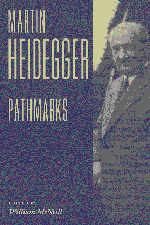Book contents
- Frontmatter
- Dedication
- Contents
- Editor's Preface
- Preface to the German Edition
- Comments on Karl Jaspers's Psychology of Worldviews (1919/21)
- Phenomenology and Theology (1927)
- From the Last Marburg Lecture Course (1928)
- What Is Metaphysics? (1929)
- On the Essence of Ground (1929)
- On the Essence of Truth (1930)
- Plato's Doctrine of Truth (1931/32, 1940)
- On the Essence and Concept of Φύσιζ in Aristotle's Physics B, I (1939)
- Postscript to “What Is Metaphysics?” (1943)
- Letter on “Humanism” (1946)
- Introduction to “What Is Metaphysics?” (1949)
- On the Question of Being (1955)
- Hegel and the Greeks (1958)
- Kant's Thesis about Being (1961)
- Notes
- References
- Editor's Postscript to the German Edition
From the Last Marburg Lecture Course (1928)
- Frontmatter
- Dedication
- Contents
- Editor's Preface
- Preface to the German Edition
- Comments on Karl Jaspers's Psychology of Worldviews (1919/21)
- Phenomenology and Theology (1927)
- From the Last Marburg Lecture Course (1928)
- What Is Metaphysics? (1929)
- On the Essence of Ground (1929)
- On the Essence of Truth (1930)
- Plato's Doctrine of Truth (1931/32, 1940)
- On the Essence and Concept of Φύσιζ in Aristotle's Physics B, I (1939)
- Postscript to “What Is Metaphysics?” (1943)
- Letter on “Humanism” (1946)
- Introduction to “What Is Metaphysics?” (1949)
- On the Question of Being (1955)
- Hegel and the Greeks (1958)
- Kant's Thesis about Being (1961)
- Notes
- References
- Editor's Postscript to the German Edition
Summary
[373] In the summer semester of 1928 this lecture course set itself the task of attempting a confrontation with Leibniz. This intent was guided by its perspective on the ecstatic being-in-the-world of human beings granted by a look into the question of being.
The first Marburg semester of 1923/24 had ventured a corresponding confrontation with Descartes, one which then became part of Being and Time (§§19–21).
These and other interpretations were shaped by the insight that in our philosophical thought we are a dialogue with the thinkers of previous times. Such a dialogue means something other than completing a system of philosophy through a historiographical presentation of philosophy's history. Nor should it be compared to that unique identity that Hegel attained for the thinking of his thought or of the history of thinking.
In keeping with tradition, the metaphysics that Leibniz develops is an interpretation of the substantiality of substance.
The following text, which has been excerpted and revised from the said lecture course, attempts to show the projection and guiding thread on the basis of which Leibniz determines the being of beings.
The word Leibniz chooses to designate the substantiality of substance is already indicative. Substance is monad. The Greek word μονáζ means the simple, unity, the one. But it means also: the individual, the solitary. Leibniz uses the word monad only after he had developed his metaphysics of substance, after 1696.
- Type
- Chapter
- Information
- Pathmarks , pp. 63 - 81Publisher: Cambridge University PressPrint publication year: 1998
- 1
- Cited by



